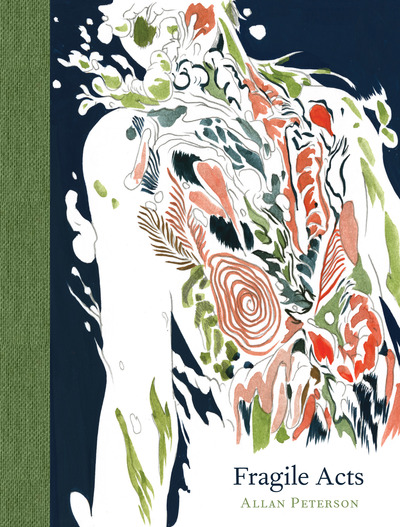In the weeks leading up to the February 28 announcement of the 2012 NBCC award winners, Critical Mass highlights the thirty finalists. Today in our series, NBCC board member Barbara Hoffert offers an appreciation of poetry finalist Fragile Acts (McSweeney's Books) by Allan Peterson.
 “It was like speech was the energy that organized the system,” says Allan Peterson in Fragile Acts, a triumphant collection in which speech—rich, skewed, exacting, embroidered, eye-popping, even slightly surreal—really does make every effort to organize the perceptible world. But if the world is irreducibly itself, carbons and polysaccharides inevitably linking, silent stone implicating the fire that forged it millennia ago, our perception of it is ever slippery, a fragile act that forms, shifts, cracks, and reforms in the arresting parallels that Peterson proposes. In these intensely layered poems, ferns curls like hands, the moon might become plastic dinnerware, dots on star charts recall roach droppings, and those carbons and polysaccharides “are strung like lights and vertebrae”—all instances of our seeking clarity, a human tendency that’s a decided afterthought in the universe: “The ocean seems endless when two dolphins divide it. / Epistemology follows.”
“It was like speech was the energy that organized the system,” says Allan Peterson in Fragile Acts, a triumphant collection in which speech—rich, skewed, exacting, embroidered, eye-popping, even slightly surreal—really does make every effort to organize the perceptible world. But if the world is irreducibly itself, carbons and polysaccharides inevitably linking, silent stone implicating the fire that forged it millennia ago, our perception of it is ever slippery, a fragile act that forms, shifts, cracks, and reforms in the arresting parallels that Peterson proposes. In these intensely layered poems, ferns curls like hands, the moon might become plastic dinnerware, dots on star charts recall roach droppings, and those carbons and polysaccharides “are strung like lights and vertebrae”—all instances of our seeking clarity, a human tendency that’s a decided afterthought in the universe: “The ocean seems endless when two dolphins divide it. / Epistemology follows.”
Poets play with language, exploring its outer limits, and in that regard Peterson is matchless; just watch him “towel off the light” and compare ideas to “onions…dropping their pale skins / to the floor.” But in poem after poem what Peterson’s really exploring is the limits of our understanding; “nothing can be learned by more analysis,” he insists, and for all our hungering, we’re left less with the reliably real than our way of looking at it. Yet despite our shaky access, Peterson displays the world we rub against as a teeming and radiant place. We cannot read that “blackbirds are only sucking color from things/ around them” or that “Smoke rising up curls down the same shapes / as ink through water” without having a changed view of our surroundings.
More significantly, as Peterson engages exuberantly in the act of sorting things through, he shows us that it’s the very sorting that matters. We exist, therefore we create connections, and when we’re as generous as Peterson we create boldly. “Elaboration is a lover’s response / to the numinous,” says this lover of blackbirds and buildings, beauty and light bulbs, moon, stars, rocks, and the evening news, and the elaboration here is protean and endlessly inventive. It’s no surprise that these visually acute poems are created by someone trained as an artist.
“Nothing’s in isolation / but is accompanied by lists of relations,” declares Peterson in one of his honeycombed pieces, and the lines he draws between things shimmer with awakened meaning. New measures and markers, new ways of seeing, new ways of being in the world: Peterson delivers them all as he creates an indelible whole. He warns against simplifying, so there’s no spoon feeding. Each poem is its own labyrinth, complex and angled and ornate in ways that can make us feel inadequate, but we eagerly follow the unwound thread. In the end it leads us to clear light, “the real and imagined between which is no difference.”
Links:
LA Review of Books review: http://lareviewofbooks.org/article.php?id=986&fulltext=1
Prick of the Spindle interview http://www.prickofthespindle.com/interviews/6.2/peterson_interview.htm

